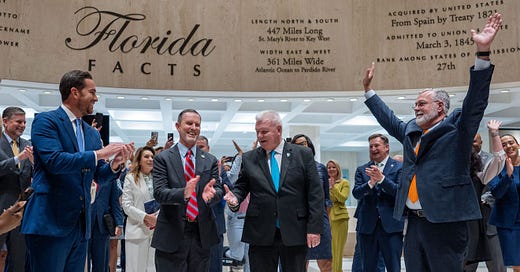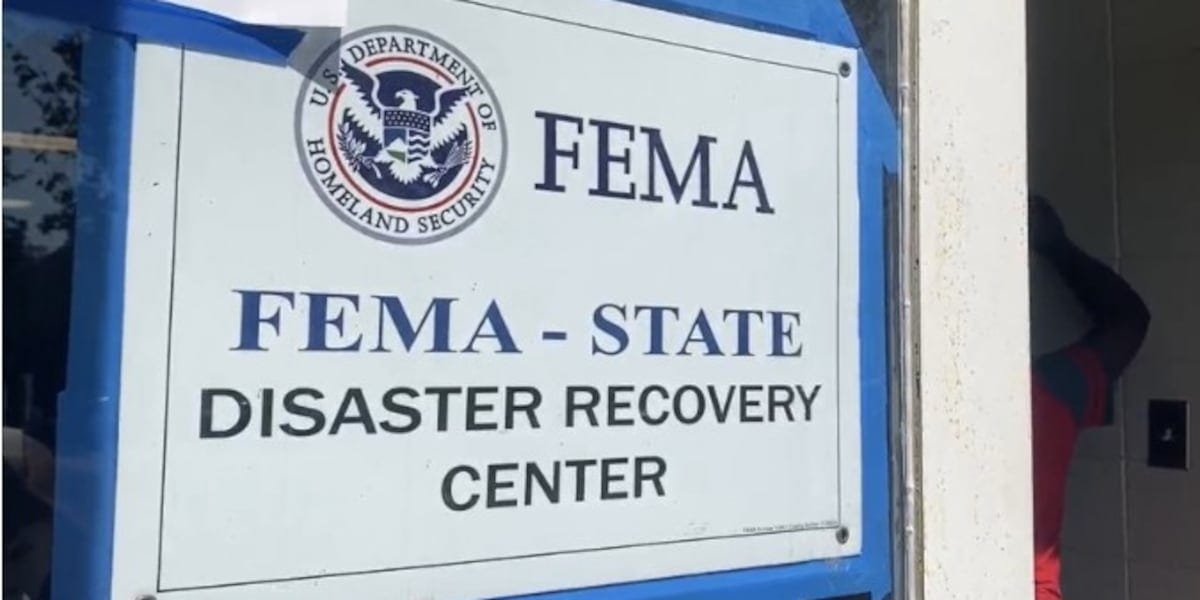Florida Lawmakers Approve $115B State Budget & Tampa Bay Rays Enter Talks to Sell Team
June 18, 2025 - This Week's News from Central Florida
Welcome to this week’s edition of the Central Florida Times, an independent, reader-supported newsletter focusing on the Sunshine State. These are the most important stories you need to know from across Central Florida. To never miss an update, subscribe here:
Here’s the latest from Central Florida…
Florida Lawmakers Approve $115B State Budget
State lawmakers voted to approve a $115.1 billion state budget following a legislative session that stretched six weeks past its scheduled end and was fraught with tense negotiations. The finalized spending plan—about $3 billion smaller than the current fiscal year—reflects both political compromise and shifting priorities between the House and Senate amidst a cooling and evolving economy. The 2025 Legislative Session officially concluded late Monday evening, with the state Senate unanimously approving the spending blueprint and state House lawmakers voting 103-2 for its passage. A key feature of the new budget is Republican leaders’ priority to bolster the state’s Budget Stabilization Fund with an additional $750 million, pushing the already robust reserves above $5 billion. Legislators intend to seek voter approval next year for a constitutional amendment that would permanently mandate similar annual contributions, a move Republicans champion as a bulwark against future economic uncertainties and potential federal cuts to programs like Medicaid and disaster aid under FEMA. This follows the years of federal COVID-19 pandemic relief dollars that are no longer available for states.
The budget's shape reveals a discernible shift in the dynamic between Governor Ron DeSantis and the Florida Legislature. Several of the governor's signature initiatives, including staffing for the Hope Florida program, funding for his Job Growth Grant Fund, ongoing Everglades restoration, and support for the Florida State Guard, received less funding than requested or were left unfunded entirely. While the budget is $500 million leaner than the governor’s February spending plan proposal, millions will still flow to the governor’s key objectives, and the First Lady Casey DeSantis-backed state cancer grant fund will benefit with a $60 million allocation. The broad tax cut proposals pushed by DeSantis, which largely led to the extended legislative session and a bitter divide among lawmakers, were pared down, with the final budget delivering $1.3 billion in tax relief. This figure prominently features Governor DeSantis' long-pursued initiative to repeal the 2% business rent tax, a move expected to reduce state revenue by approximately $900 million annually. The remainder of the tax cuts is largely comprised of sales-tax holidays, such as a permanent back-to-school sales tax holiday every August and permanent exemptions on certain outdoor recreational goods, both billed as a savings for Florida families. Notably, Gov. DeSantis' well-publicized push for property tax relief for homesteaded property owners did not materialize as envisioned; however, lawmakers have laid the groundwork for a potential constitutional amendment ballot initiative as early as next year. A proposed amendment could significantly reform or even eliminate the existing property tax levy, aiming to provide relief to Floridians who have experienced rapidly rising property values and increased tax burdens as a result.
Fiscal constraint was also a dominant theme incorporated into the budget, with $830 million allocated for reducing state debt and cutting 1,700 vacant state government positions. Raises for teachers’ salaries were among the cuts—reduced to $100 million versus $250 million in the current fiscal year—and healthcare agencies also saw reductions. Additionally, the drawn-out negotiations between the House and Senate dedicate $560 million for local project funding, $460.7 million for water initiatives, and $200 million toward conservation easements. The latter is seen as a cost-effective alternative for protecting rural and agricultural lands, as it does not involve outright land purchases, and the state does not incur management costs. The resolution of budget disagreements not only avoids a government shutdown but also sets the stage for a smooth transition into the new fiscal year on July 1, with DeSantis poised to sign the budget and issue line-item vetoes within the next two weeks.
Tampa Bay Rays Enter Talks to Sell Team
The Tampa Bay Rays have entered exclusive, advanced negotiations to sell the team, officials confirmed Wednesday. The organization revealed ongoing discussions with an investor group led by Jacksonville-based homebuilder Patrick Zalupski, founder and CEO of Dream Finders Homes. The proposed deal reportedly values the team at approximately $1.7 billion. Zalupski, who is a University of Florida trustee and operates a national business with operations in 10 states, has been reported to have already signed a letter of intent. The buyer group he represents also includes Bill Cosgrove, Ken Babby, and several other prominent Tampa Bay business leaders. The team and the group have declined further comment during the negotiations. The announcement comes as the team faces significant uncertainty regarding its long-term home. Rays principal owner Stu Sternberg, who bought the franchise in 2004 for $200 million, is reportedly under pressure from Major League Baseball leadership to step aside. Commissioner Rob Manfred and other owners have encouraged a transition following years of failed stadium proposals, including the deal for a new 30,000-seat domed stadium in St. Petersburg's Historic Gas Plant District, set to open in 2028, which was scrapped by the team in March 2025. The decision followed significant damage to Tropicana Field, the Rays' home stadium, during Hurricane Milton and the ensuing delays and increased cost projections for a new ballpark. The team is currently playing its 2025 home games at Steinbrenner Field in Tampa, with the City of St. Petersburg working to repair Tropicana Field for a possible 2026 return. The team's lease with the city extends through 2028, leaving its future beyond that date unclear as sale discussions proceed. If the deal to sell the team proceeds, it must gain MLB approval.
Trump Administration Plans to Dissolve FEMA After 2025 Hurricane Season
President Donald Trump announced plans to significantly reduce the role of the Federal Emergency Management Agency (FEMA), but not until after the 2025 hurricane season concludes. Speaking from the White House last week, Trump said he aims to shift disaster response authority to state governments, calling it a move to increase local responsibility and reduce federal spending. He added that he would like to see FEMA "largely eliminated," believing governors should be prepared to manage emergencies. Homeland Security Secretary Kristi Noem, who oversees the agency, said the changes would ensure “taxpayers are only fulfilling the need which is appropriate.” This announcement follows an executive order signed by Trump in March signaling a shake-up at FEMA by directing state and local governments to take the lead in storm preparations. The overhaul would mark a sweeping departure from longstanding federal disaster relief practices, which currently include grants to states, direct assistance to victims, and on-the-ground deployments. The agency has already seen a reduction in staff and has begun scaling back financial support, with billions in grant funding being frozen. A new council will be formed to redesign FEMA’s role, Noem said.
A phase-out of FEMA would significantly impact Florida's disaster response and recovery efforts, given its extreme vulnerability to natural disasters, particularly hurricanes. The Sunshine State has historically received more FEMA assistance than any other U.S. state. Since 2015, Florida has received more than $2.5 billion in direct relief funding from FEMA's Individuals and Households Program (IHP) payments, according to data collected for the Carnegie Endowment for International Peace's Disaster Dollar Database. Another $3.1 billion was paid to Florida in grants, disaster loans, and flood insurance payments after Hurricane Ian, a Category 5 storm, devastated southwest Florida in 2022. While specifics of a FEMA wind-down are unknown, the implemented plan would likely include less federal dollars to states and municipalities, increasing their financial burden in storm preparedness and post-storm recovery. FEMA currently covers more than 75% of disaster recovery costs for states, including debris removal, infrastructure repair, and emergency housing. Additionally, Floridians could face higher out-of-pocket expenses for repairs as well as increased insurance premiums and a slower return to normalcy after a storm. While financial assistance is a crucial component of FEMA's support, its role extends beyond funding to include coordinating multi-state disaster responses, managing volunteer efforts, and providing experienced personnel and critical infrastructure. Without this, Florida may find its emergency management system overstretched, especially during large-scale disasters that overwhelm local capacities. Such a federal withdrawal could also disproportionately impact rural and low-income communities, which often rely more heavily on FEMA’s expertise and funding as a result of their limited local resources. These potential impacts are particularly pertinent as the current Atlantic hurricane season, which ends November 30, is projected to be more active than usual. Forecasts are predicting at least 17 named storms and at least four major hurricanes.
Florida Leads Nation with Billions in Spending Cuts, Tax Relief
After a prolonged 102-day legislative session marked by infighting and stalled negotiations, Florida lawmakers have finalized a $115.1 billion budget for the next fiscal year, charting a distinct fiscal course with an unprecedented $3.8 billion in cuts—the most in the nation. The spending plan aims to curb what lawmakers describe as uncontrolled spending in Tallahassee and prepare for potential federal funding cuts. House Speaker Daniel Perez (R-Miami) emphasized the need for a leaner budget, stating that past federal funding has led to unsustainable spending habits. The reduced spending pairs with the $1.2 billion in tax cuts for the upcoming fiscal year. State officials, including Republican Party of Florida Chairman Evan Power, are touting the move as a model of conservative governance and a catalyst for economic growth. Power highlighted Florida’s low taxes, absence of a state income tax, and streamlined regulations as key factors attracting businesses, residents, and tourists. Florida leaders frequently contrast their strategy with Democrat-led states, citing examples like California's high taxes, New York's $11 billion budget increase, and Illinois' largest budget in history, alongside $1 billion in new taxes. Conservatives have argued that these states' fiscal conditions have led to job loss, slowed investment, and increased out-migration of families fleeing to states like Florida, which has seen a more than 8.5% population increase since 2020. Despite the latest budgetary cuts, state spending has grown by over 26% since Governor Ron DeSantis took office in 2019, raising concerns about long-term sustainability and strained state resources.
UCF Stadium Embraces "Bounce House" Nickname in New Naming Deal
The University of Central Florida's football stadium, long endeared by fans as "The Bounce House" due to its distinctive vibrations from energetic crowds, will officially incorporate its popular nickname into its new identity. Effective July 1, the on-campus venue will be known as the Acrisure Bounce House, following approval by the UCF Board of Trustees last week. The rebranding is a result of naming rights partner FBC Mortgage's decision to transition its mortgage services to Acrisure Mortgage. The “Bounce House” moniker has been a staple since the stadium opened in 2007, inspired by fans jumping in unison and causing the structure to shake. The facility continues to evolve, with the ongoing expansion of the Roth Tower also underway this year.
Nearly Half of Florida Households Living Paycheck to Paycheck, Study Finds
A new United Way study reveals that nearly half of all Floridians, or approximately 4 million households, are struggling financially despite being employed. These individuals, categorized as ALICE (Asset Limited, Income Constrained, Employed), often earn too much to qualify for state benefits but insufficient wages to cover basic living expenses, forcing them to live paycheck to paycheck. Only Louisiana, Mississippi, and New York have a higher percentage of residents facing similar financial strain. Florida's escalating affordability crisis is identified as the primary culprit. A surge in population since the pandemic, coupled with rising costs—particularly for housing, groceries, and childcare—and stagnant wages, has pushed many households to the brink. Over half of Florida's renters are "cost-burdened," dedicating 30% or more of their income to housing, with nearly three in ten spending over half their pay. The Florida Chamber of Commerce warns that if these challenges persist, many essential workers, especially parents and younger residents, may be forced to leave the state, potentially harming local economies. United Way estimates a Florida family of four needs to earn $74,000 annually just to cover essential purchases.
St. Petersburg Considers 'Clean & Safe' Program to Address Downtown Safety, Cleanliness
The St. Petersburg City Council is weighing a new “Clean & Safe” initiative aimed at improving conditions downtown, a dialogue sparked by recent pleas from residents and businesses seeking enhanced safety and cleanliness following a fatal stabbing. The proposed program, presented at a recent City Council meeting, would fund sidewalk cleaning, graffiti removal, and safety ambassadors to support police and engage with individuals experiencing homelessness. Jason Mathis, CEO of the St. Petersburg Downtown Partnership, clarified that the initiative is not "anti-homeless" but rather aims to connect the unhoused to mental health and housing resources. The proposed pilot would target high-traffic areas like Beach Drive, Central Avenue, and Williams Park, with potential funding coming from business fees, parking revenue, private donations, or redevelopment dollars. The proposal comes amidst mixed community reactions; while some residents have petitioned in support, others voiced concerns that it might exclude or criminalize the city's homeless population, especially following Governor Ron DeSantis's recent statewide ban on public sleeping. Council members acknowledged the need for outreach-focused efforts that emphasize resource connection, not just enforcement. City leaders will hold further discussions to refine the proposal and ensure it complements existing programs like the city’s social worker-led CALL initiative.
Lawmakers Decline Funding for DeSantis' Hope Florida Initiatives
State legislators have declined to fund a key component of Gov. Ron DeSantis’ Hope Florida initiative, choosing not to allocate $2 million for staffing the program’s call line in the new state budget. The decision also blocks DeSantis’ request for four new positions to establish an Office of Hope Florida within the governor’s office. The helpline, 833-GET-HELP, has been central to the four-year-old program, which connects residents with churches and nonprofits to reduce dependence on government assistance. Hope Florida, championed by First Lady Casey DeSantis, currently operates through federal child abuse prevention grants which are set to expire. However, lawmakers may revisit the issue next session. The program has faced scrutiny over its transparency and financial management, particularly concerning a controversial transfer of $10 million from a state Medicaid settlement. These funds were initially allocated to two nonprofits but were subsequently redirected to a political committee, potentially in violation of state law. Gov. DeSantis’ office insists no wrongdoing and stated that the program will continue. A criminal investigation into the financial transfers is ongoing by the Leon County State Attorney’s office.
St. Pete-Clearwater Airport Plans $45M Parking Garage to Meet Soaring Demand
St. Pete-Clearwater International Airport (PIE) is moving forward with plans for its first structured parking garage, a $45 million project aimed at alleviating strain from unprecedented passenger growth. The airport is projected to serve 2.74 million passengers in 2025, surpassing its 2023 record of 2.49 million, prompting an urgent need for increased parking capacity. Pinellas County, which operates the airport, issued requests for proposals on June 6 for a 1,300-space pre-cast garage and a 500-space surface lot. This four-level garage will replace an existing economy lot, located on the terminal side of Roosevelt Boulevard, and offer faster access via an improved shuttle route. Allegiant Airlines is credited for driving record growth at St. Pete-Clearwater International Airport, with the proposed garage complementing the ongoing $180M–$220M terminal expansion—the largest project in PIE’s history.
Florida Nears Inmate Execution Record
Florida is on track to match its highest number of executions in a single year since capital punishment was reinstated in 1976. Governor Ron DeSantis recently signed a death warrant for Michael Bernard Bell, 54, scheduled for July 15. Bell was convicted in the 1993 Duval County murders of two individuals, who were shot with an AK-47 outside a Jacksonville bar. If Bell's execution proceeds, following the planned lethal injection of Thomas Gudinas on June 24, the state will reach eight executions for the year. This figure would equal the records set in 1984 and 2014, according to Florida Department of Corrections data.
Thanks for reading this edition of the Central Florida Times. To never miss an update, subscribe for free:
In the meantime, if you learned something or found this read interesting, please consider sharing it to grow our community!










